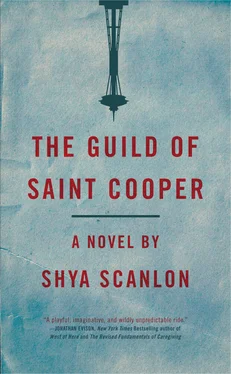Just as I retrieved my hand I began to hear voices, or perhaps just a single voice, coming from behind the door. It was unintelligible from where I stood, mere murmuring, but as I drew closer I could make out words. Cry was the first word I felt certain I’d heard correctly. Then see, or sea. I moved closer and heard something like aces , then tragic , then as I drew closer still I could make out phrases — strange, incantatory phrases I struggled to make sense of. Was it “Drunken choral water called”? Was it “The meaning of lungings of the otter and the wind”? Was it “The single artificial word she sang”?
Only with my ear to the door, my ear slowly sinking into the door’s dull flesh, did I realize, finally, that it was poetry. And so, without trying to understand, I finally heard it most clearly:
Oh! Blessed rage for order, pale Ramon,
The maker’s rage to order words of the sea,
Words of the fragrant portals, dimly-starred,
And of ourselves and of our origins,
In ghostlier demarcations, keener sounds.
And in the deep silence after the recitation my body relaxed, and because I’d been holding myself from leaning too hard on the soft door, I fell against it, and because the door itself was something shy of solid, I passed through.
Inside the small, rounded room was a bare wooden table at which three naked people sat. Two women, one young and the other old — daughter and mother, I decided — were facing me. They were not shy, but they looked at me with a sorrow that while resigned had not settled so far into their selves that a glimmer of hope for me could not be felt. I traced it across the girl’s brow before it disappeared back into the meekness of her eyes. The figure facing them was male, and though his bony back was covered with age spots, it was strong in its ropy thinness, like a sapling that had grown old but not up. It wasn’t until the man turned around in his chair that I recognized him as George Washington.
“Ah, good,” he said. “You’ll be safe here.”
I opened my mouth to speak, but instead of sound bright light poured out, flooding the room with a whiteness so sharp I had to close my eyes. And with my eyes closed my body lurched to one side. I felt hands at my arms and legs and heard the opening of a sliding door. I was placed down on a hot, gravelly surface, and something that felt like a small, balled-up blanket was dropped on my side.
“Count to fifty before removing your blindfold.”
I rolled onto my back, felt the sun on my face, and tried to nod my assent. The door slammed and the van drove off, leaving me with only the sounds of birds and the distant hum of a lawnmower. I began to count, but I could get only to ten, fifteen, before my attention would wander from the task. The bonds that linked these numbers had grown weak, it seemed, and I’d be left groping for whatever number came next to mind rather than next in line, before, with a start, beginning again, flush with anxiety that I’d arrive at my target too soon and see something I shouldn’t.
Why had I been let go? How could Mitch have been satisfied by my answers — or my singular answer. Hadn’t I dodged the first two? Perhaps my incredulity had been answer enough. I tried to remember being held, the experience of it, the sense perceptions, but failed. It was impossible for me to feel anything other than the sun’s heat on my face. The hard, dry surface at my back. My head began to pound. Eighteen, nineteen, twenty. The blindfold no longer provided any relief.
I’D SPENT MUCH OF the following twenty-four hours shut up in my room, sleeping and trying to determine both what had happened to me and who, if anyone, I could tell about it. My mother was obviously not an option. Who else was there? My brother, if I could even get through to him, would simply instruct me to leave town. Not only that, he’d insist my mother leave too — who could say, he’d say, whether my abductors would be content with just the one abduction? They hadn’t learned much, after all. Perhaps they’d be back. Perhaps they’d just taken me to scare me and would now wait and watch, assuming I’d lead them right to Dale Cooper. Perhaps the whole family was at risk. The irony was that I’d been very nearly prepared to tell Mitch Earl all of what I knew. Why had he thought it necessary to scare it out of me? The possibility remained that it hadn’t been him, of course, or that he was operating under orders. Could Weyerhaeuser have been responsible? It didn’t seem likely that Blake would think it necessary. But surely there were people who could override Blake’s opinion. The Lights themselves, for instance.
The other question that remained was whether or not I’d been Lit, but I couldn’t figure out how to answer it. What would being Lit feel like? I imagined my clothes fitting just slightly tighter, my body having made room for another life. I pictured my skin faintly glowing with an aura that irritated the air like heat radiating off the road. I thought of all the smooth muscle movement within my body: the heart, the lungs, the skin secreting oil; I thought of my empty intestines, because I was hungry, a dumb caterpillar of processed food — surely there was no shortage of places to hide inside a man, places I’d never considered. Would I even recognize the visitor as unrecognizable? Perhaps the presence of a Light inside me would masquerade as something utterly familiar, like nausea, or sadness, or gas.
I got dressed and descended the stairs slowly, carefully, not wanting to disturb the headache I could feel sleeping in a lacuna of the bone above my eyes. It reminded me of my brother’s claim, as a child, that if he concentrated he could move an itch he couldn’t reach to a place he could. From the middle of his back to his stomach. Or if he was feeling lazy, from his leg to his arm. He could even, he swore, move it around the surface of his skin until it disappeared, like an ice cube. Had he been honest with me? I couldn’t remember whether or not I’d believed him at the time, but it had become an anecdote I’d use occasionally, whenever the subject of the body/mind dichotomy was raised — usually in small rooms full of smoke and sweaty young men. In truth I would have loved to see Kent. Where had he brought his family? I couldn’t remember. As I came to the bottom of the stairs, I realized I could barely even picture his face.
The sun burned monstrously outside, and I dreaded its flattening hotness as I looked at my suit hanging by the door. They’d thrown it down at me after taking me from the van, careless of my condition or else sure of it. My mother had left the radio on; it was reporting a story about a man found tampering with a particle accelerator in France. The man was from the future. He’d been sent here to fix a glitch. I pulled the plug.
Alice answered the door, squinting up at me with a grimace. Her naked body was a lake I could fall into, and I hovered on its edge, trying to get my balance. She sighed loudly and stood aside, then walked past me to the kitchen as I pulled off my mask.
“You can’t stay,” she said, opening a bottle of water.
“I need to talk.”
Sunlight shot through the window to my right, and in the silence I watched the lit dust slow. After glowering at me for a moment, Alice walked back out back to where she’d been sunbathing. I stopped in the kitchen to get a glass of water, and in the cabinet found a knife block wrapped in tape behind Christmas-themed coffee cups.
“Zane’s been here,” I said through the screen door.
“Is that what you need to talk to me about? Christ, Blake.”
“No,” I said. “I’m sorry. I just noticed the knives.”
“The knives? Listen, dude, are you trying to be creepy or what? Do me a favor and stop standing there in the doorway looking at me.”
Читать дальше












